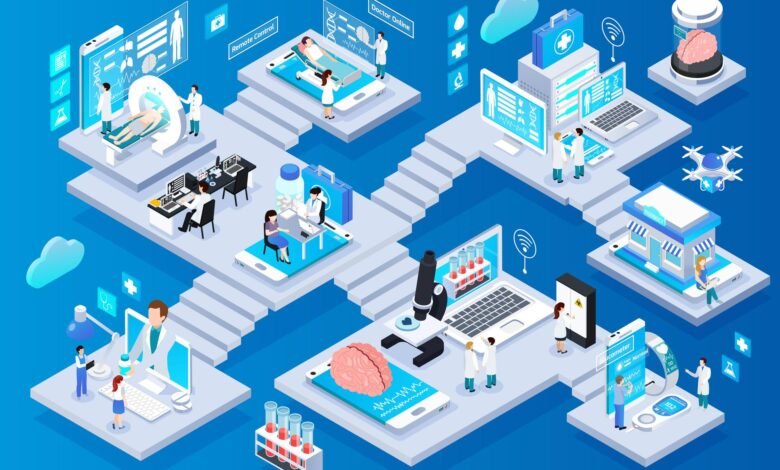The Digital Transformation Revolutionizing Healthcare
Navigating the Digital Healthcare Landscape: A Comprehensive Look at the Future of Medicine

Introduction
In the age of rapidly advancing technology, digital transformation is reshaping industries across the board, and healthcare is no exception. The healthcare sector is undergoing a profound shift towards digitalization, revolutionizing patient care, operational efficiency, and medical research. This article explores the key aspects of digital transformation in healthcare and its impact on patients, providers, and the industry as a whole.
-
Electronic Health Records (EHRs) and Interoperability
One of the foundational elements of digital transformation in healthcare is the adoption of Electronic Health Records (EHRs). EHRs replace traditional paper records, enabling healthcare providers to store, access, and share patient information electronically. This shift improves the accuracy and efficiency of record-keeping, reduces the risk of errors, and ensures that vital patient data is accessible when needed. Moreover, interoperability standards are being developed to facilitate the seamless exchange of EHR data between different healthcare systems and providers, ensuring comprehensive patient care.
-
Telemedicine and Remote Monitoring
The advent of telemedicine has been a game-changer in healthcare delivery. Telehealth technologies allow patients to consult with healthcare providers remotely, increasing access to medical services, especially in rural or underserved areas. Beyond telemedicine, wearable devices and IoT (Internet of Things) sensors enable remote patient monitoring, making it easier to track chronic conditions, post-operative recovery, and overall wellness. This remote monitoring not only improves patient outcomes but also reduces the burden on healthcare facilities.
-
Artificial Intelligence (AI) and Machine Learning
AI and machine learning algorithms are transforming healthcare in numerous ways. From medical image analysis to predictive analytics for disease identification and risk assessment, AI is assisting clinicians in making more accurate diagnoses and treatment decisions. Additionally, chatbots and virtual assistants are being deployed to enhance patient engagement, answer common medical questions, and streamline administrative tasks.
-
Personalized Medicine
Digital transformation enables healthcare providers to deliver more personalized treatment plans. By analyzing large datasets and considering genetic, lifestyle, and environmental factors, healthcare professionals can tailor treatments to individual patients. This approach is particularly impactful in areas like cancer treatment, where targeted therapies are becoming more common, leading to improved outcomes and reduced side effects.
-
Data Security and Privacy
With the increasing digitization of healthcare data, ensuring the security and privacy of patient information is paramount. Healthcare organizations are investing in robust cybersecurity measures and compliance with regulations like the Health Insurance Portability and Accountability Act (HIPAA) to safeguard patient data. Blockchain technology is also gaining traction in healthcare for its potential to enhance data security and streamline data sharing.
-
Enhanced Data Analytics
Advanced data analytics tools are helping healthcare organizations derive valuable insights from their vast datasets. By analyzing patient records, treatment outcomes, and population health trends, healthcare providers can make informed decisions to improve care quality, optimize resource allocation, and reduce costs. Data-driven decision-making is at the core of modern healthcare management.
-
Streamlined Administrative Processes
Digital transformation extends beyond patient care to streamline administrative tasks. Electronic appointment scheduling, billing, and insurance claims processing reduce administrative overhead and improve the overall patient experience. Administrative staff can focus on more value-added tasks, while patients experience reduced waiting times and paperwork.
Conclusion
Digital transformation is revolutionizing healthcare, ushering in an era of patient-centric, data-driven, and technologically advanced medicine. The adoption of EHRs, telemedicine, AI, and personalized medicine is not only improving patient outcomes but also driving operational efficiencies within healthcare organizations. However, as the healthcare industry evolves, it must remain vigilant in addressing data security and privacy concerns to maintain the trust of patients and comply with regulatory requirements.
As technology continues to advance, the potential for further innovation and transformation in healthcare is vast. Healthcare stakeholders, including providers, insurers, researchers, and policymakers, must continue to collaborate and invest in digital solutions to ensure that the benefits of this digital revolution are realized by all, ultimately leading to better healthcare outcomes and improved quality of life for patients worldwide.





